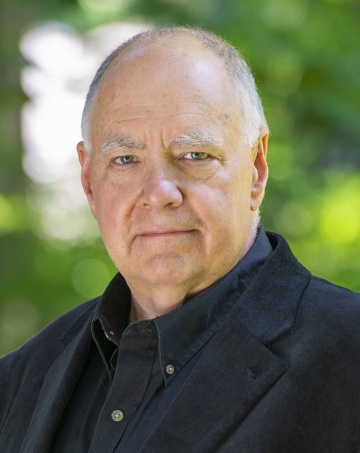Columbia College | Columbia University in the City of New York
Take Five with Charles Philipp Martin ’76

Charles P. Martin ’76
Photo by Lincoln Potter
What were you like when you arrived at Columbia?
The word that comes to mind is “aimless.” That’s not always a bad thing: Why aim if you can’t see a target? I came to Columbia with no idea of what career path I’d follow, other than knowing it wouldn’t involve mathematics. So I took courses that interested me: philosophy, art history, psychology, mythology, German history, political science, opera, anthropology and of course, orchestra. A writer could do a lot worse. My friends who pursued pre-med or pre-law were an alien, if much admired, species. By the time I graduated, my aim was still off, but at least I was no longer aimless.
What do you remember about your first-year living situation?
I lived in that exemplar of the International Cinderblock style, Carman Hall. My roommate, David Fraser ’76, was destined to become a journalist and expert in Chinese affairs. Even then David was addicted to newspapers. I collected piles of record albums, so we were a kind of Odd Couple with two Oscars and no Felix. I asked him why he kept six-month-old copies of The New York Times under his bed; he said he hadn’t gotten around to reading them yet. We let our dirty dishes gather microbes in the shared bathroom sink until our neighbors wrote us an angry note. They were med students, and probably knew what we were incubating there.
What class do you most remember and why?
My Freshman Seminar was on Dickens’s Our Mutual Friend. It was taught by a stupendous professor, Florian Stuber GSAS’80, who was a member of a local Dickens society. We read the novel aloud, going around the room with each student doing one page. I was hooked: The class not only gave me a love of Dickens, but also impressed upon me the godlike powers of the best writers: creating living beings along with their destinies. Professor Stuber dug a well from which I’m still drawing inspiration. In fact, while writing this I had a revelation of sorts: My novel Neon Panic begins the same way Our Mutual Friend does, with a body floating in the water.
I chose Stuber’s class because I’d already taken his course in expository writing, which had knocked me back to square one. Like many who breezed through high school English, I thought I was a hotshot writer. But my first essay came back from Stuber covered in red ink. Having my ego squashed at the outset was the best thing that could have happened to me.
Did you have a favorite spot on campus, and what did you like about it?
It wasn’t the Sundial or the library; it was the darkened room in which any given art history class took place. Spending an hour with nothing to do but contemplate the beauty of paintings was church, psychotherapy and Valium all in one.
What, if anything, about your College experience would you do over?
Writing is a solitary occupation. Had I been wiser I’d have made more friends and stayed in touch with them. Looking back, Columbia introduced me to many remarkable people in their larval forms. They’d be pretty interesting to hang out with today.

